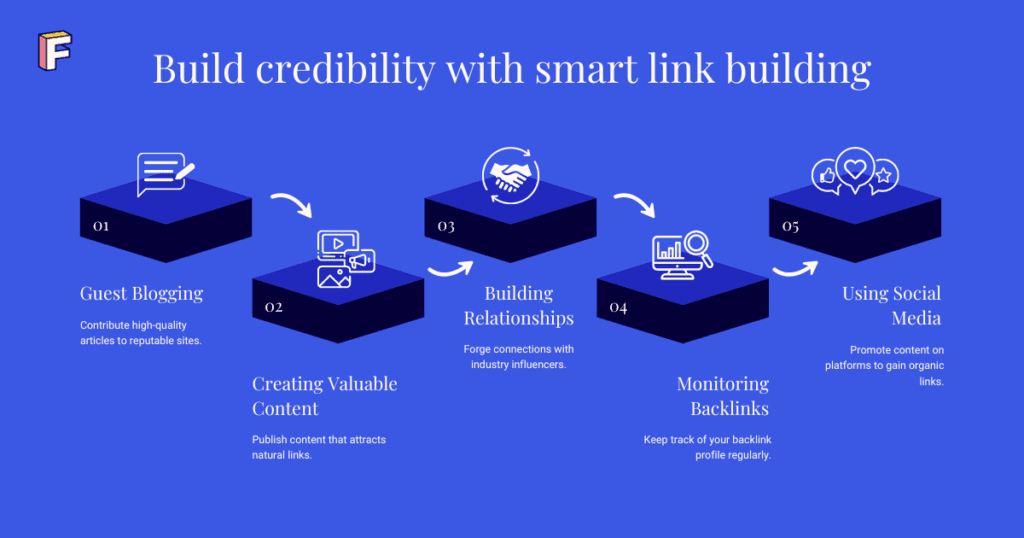How startups can build credibility with smart link building
Startups in the B2B often face intense competition, with many struggling to gain visibility and credibility in their industry. A significant reason behind this staggering statistic is the use of ineffective marketing strategies. Often, startups overlook foundational elements like link building, assuming it’s outdated or no longer relevant. Although link building has changed over time, it’s still a key part of a strong SEO strategy when done correctly. Ignoring it can lead to missed opportunities in building credibility and driving organic growth.
Table of Contents
What are backlinks?
Backlinks are the connections between different websites. Think of them as digital referrals, where one site links to another. When a trusted site includes a link to your content, it sends a signal to search engines that your website is valuable. This is similar to getting a recommendation from a respected person in your field—it boosts your credibility.
Why do backlinks matter?
Not all backlinks are created equal. The reputation of the site linking to you matters a lot. A single backlink from a well-regarded, high-authority site can do more for your credibility than dozens of links from less trustworthy sources. It’s like networking in the real world—a recommendation from an industry expert can carry much more weight than from someone who isn’t as established. The same principle applies online with backlinks and domain authority.
Building trust with backlinks
For SaaS startups, establishing trust is often one of the biggest hurdles. People are naturally cautious about new companies, and without a proven track record, it can be tough to win them over. Backlinks can play a key role in overcoming this challenge. When other reputable websites link to your content, it sends a strong message to both search engines and potential customers: your business is reliable. These endorsements from well-known sites help build your credibility and make it easier for others to trust your product or service.
Boosting your search rankings
Search engines like Google use backlinks as a way to gauge the quality and relevance of your website. The more high-quality links you have pointing to your site, the more likely you are to rank higher in search results. For SaaS startups, this is particularly important. Higher rankings mean more visibility, and more visibility leads to more organic traffic. And since many startups operate with tight budgets, getting traffic without paying for ads can make a significant difference in growth.
Getting noticed by the right people
Another advantage of backlinks is that they help get your brand in front of a wider audience. When well-known websites in your industry link to your content, they effectively introduce your brand to their readers. This can lead to more customers, more partnerships, and a stronger presence in your market. For a SaaS startup looking to make a name for itself, these opportunities to get noticed can be invaluable.
Google’s view on link building
How Google sees it
Google cares more about the quality of your backlinks than the quantity. It’s not just about getting links from any site; they need to come from websites that are relevant to your business and have a good reputation. Google’s algorithms look for these high-quality links as a sign that your content is trustworthy and valuable. For SaaS startups, getting links from respected sites in your field can really help boost your visibility and search rankings.
Avoiding bad practices
It can be tempting to take shortcuts when building backlinks, but this can backfire. Some tactics, like buying links or using shady link schemes, can get your site penalised by Google. This could mean lower rankings or even being removed from search results. Instead, it’s better to stick to honest strategies. Focus on creating content that people want to link to and building real relationships with other sites. This way, you’ll get quality backlinks that help your site grow in the long run.
Building a credible backlink profile requires more than just scattering links around the web. It’s about making thoughtful connections and creating content that others find valuable. Here’s how startups can do this smartly.

Guest blogging and partnerships
Writing guest posts or collaborating with others in your field can bring valuable backlinks to your site. But it’s not just about getting a link—it’s about sharing your expertise with a new audience and creating content that adds value. When done right, these partnerships help both parties grow.
Create valuable content
Producing high-quality content is key. Whether it’s a detailed guide, a research report, or a helpful tool, content that genuinely helps people is more likely to attract natural links from other sites. Focus on answering real questions or solving problems, and the backlinks will follow.
Build relationships
Networking still matters in the online space. Reaching out to other website owners with a personal touch can open doors to link opportunities. It’s about creating genuine connections rather than just asking for a favour. Thoughtful, consistent communication often leads to better results.
GoodFirms is a research and review platform that connects businesses with top software and service providers. It offers detailed company profiles and genuine client reviews, helping businesses find the right partner for their projects. For vendors, being featured on GoodFirms is a great way to build credibility and gain valuable backlinks, which can improve search engine rankings and online visibility. This exposure can lead to increased traffic and create new business opportunities.
Keep an eye on your links
Your backlink profile needs regular care. By keeping an eye on your links, you can spot any that might cause problems and remove them. This keeps your site healthy and ensures you’re building a strong, beneficial profile. It’s all about focusing on quality rather than just adding as many links as possible. Regularly checking your links helps you stay on track and avoid any penalties that could harm your site’s reputation.
SE Ranking gives you all the SEO tools you need in one place. You can easily keep an eye on your backlinks and see how they’re performing. If you spot any links that might hurt your rankings, you can mark them and the platform will create a disavow file for you, ready to send to Google. It’s a simple way to stay in control of your SEO without the hassle.

FAQs
-
Is link building still important in 2024?
Yes, it definitely is. But the key is quality over quantity. It’s better to get a few strong, relevant links than to chase as many as possible. Quality links can help improve your search rankings and build credibility. -
What makes a backlink good or bad?
A good backlink comes from a trusted, relevant website, boosting your credibility and SEO. A bad backlink, on the other hand, might come from a low-quality or spammy site. These can actually harm your SEO and should be avoided. -
How long does it take to see results from link building?
It usually takes a few months to notice any changes from your link-building efforts. It’s a process that requires patience, but the long-term rewards, such as improved search rankings and greater visibility, are well worth it. -
Can I buy backlinks to speed up the process?
It’s not a good idea. Buying backlinks can lead to penalties from Google, which can hurt your site’s rankings. Instead, focus on earning backlinks by creating great content and building genuine connections within your industry.
Link building is a marathon, not a sprint. Startups that prioritise high-quality, trustworthy links will see lasting benefits. Instead of chasing quick wins, focus on creating connections that truly add value to your brand. This approach not only boosts your credibility but also builds a stronger foundation for your online presence. Remember, the trust you build with search engines and your audience is worth the wait.
Dariia Panchenko
Hi! I'm Dariia Panchenko, Analytics and Community Manager at Fractional Teams. I write about the best B2B marketing strategies and practices.
